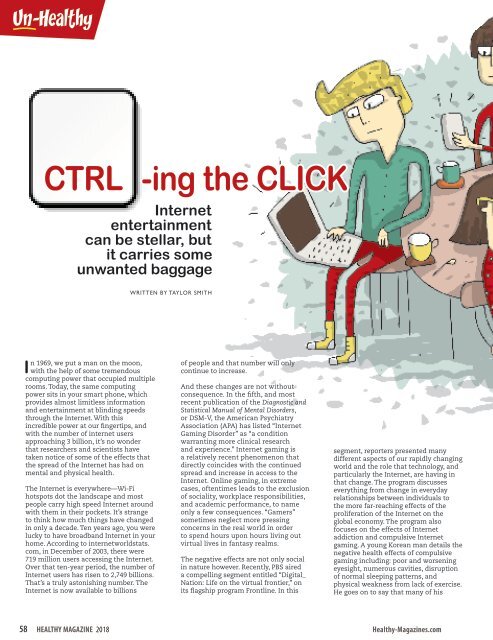You also want an ePaper? Increase the reach of your titles
YUMPU automatically turns print PDFs into web optimized ePapers that Google loves.
WRITTEN BY TAYLOR SMITH<br />
In 1969, we put a man on the moon,<br />
with the help of some tremendous<br />
computing power that occupied multiple<br />
rooms. Today, the same computing<br />
power sits in your smart phone, which<br />
provides almost limitless information<br />
and entertainment at blinding speeds<br />
through the Internet. With this<br />
incredible power at our fingertips, and<br />
with the number of internet users<br />
approaching 3 billion, it’s no wonder<br />
that researchers and scientists have<br />
taken notice of some of the effects that<br />
the spread of the Internet has had on<br />
mental and physical health.<br />
The Internet is everywhere—Wi-Fi<br />
hotspots dot the landscape and most<br />
people carry high speed Internet around<br />
with them in their pockets. It’s strange<br />
to think how much things have changed<br />
in only a decade. Ten years ago, you were<br />
lucky to have broadband Internet in your<br />
home. According to internetworldstats.<br />
com, in December of 2003, there were<br />
719 million users accessing the Internet.<br />
Over that ten-year period, the number of<br />
Internet users has risen to 2,749 billions.<br />
That’s a truly astonishing number. The<br />
Internet is now available to billions<br />
of people and that number will only<br />
continue to increase.<br />
And these changes are not without<br />
consequence. In the fifth, and most<br />
recent publication of the Diagnostic and<br />
Statistical Manual of Mental Disorders,<br />
or DSM-V, the American Psychiatry<br />
Association (APA) has listed “Internet<br />
Gaming Disorder” as “a condition<br />
warranting more clinical research<br />
and experience.” Internet gaming is<br />
a relatively recent phenomenon that<br />
directly coincides with the continued<br />
spread and increase in access to the<br />
Internet. Online gaming, in extreme<br />
cases, oftentimes leads to the exclusion<br />
of sociality, workplace responsibilities,<br />
and academic performance, to name<br />
only a few consequences. “Gamers”<br />
sometimes neglect more pressing<br />
concerns in the real world in order<br />
to spend hours upon hours living out<br />
virtual lives in fantasy realms.<br />
The negative effects are not only social<br />
in nature however. Recently, PBS aired<br />
a compelling segment entitled “Digital_<br />
Nation: Life on the virtual frontier,” on<br />
its flagship program Frontline. In this<br />
segment, reporters presented many<br />
different aspects of our rapidly changing<br />
world and the role that technology, and<br />
particularly the Internet, are having in<br />
that change. The program discusses<br />
everything from change in everyday<br />
relationships between individuals to<br />
the more far-reaching effects of the<br />
proliferation of the Internet on the<br />
global economy. The program also<br />
focuses on the effects of Internet<br />
addiction and compulsive Internet<br />
gaming. A young Korean man details the<br />
negative health effects of compulsive<br />
gaming including: poor and worsening<br />
eyesight, numerous cavities, disruption<br />
of normal sleeping patterns, and<br />
physical weakness from lack of exercise.<br />
He goes on to say that many of his<br />
58 HEALTHY MAGAZINE <strong>2018</strong> <strong>Healthy</strong>-<strong>Magazine</strong>s.com

















